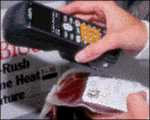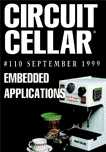A Competitor to PalmPilot?
- Reuters/New York Times 10 Sep 99 says that the creators of the PalmPilot handheld computer left their former company to form Handspring whose plan is to develop a less expensive modular machine called "Visor." The Visor will work as a digital camera, music player, pager, and wireless telephone.

Internet maps from Telegeography
- Bernie Minuk alerted me to the following Internet maps. Bell Labs have been collecting data about the Internet, and plotted tham as trees. The project is interesting in the analuysis of the changing structure of the networks. The pictures are also great.
![[Web net black]](webblack.gif)
![[Web net white]](webwhite.gif)
(Picture credits:
(a) http://www.peacockmaps.com/Postcard-black-web.gif;
(b) http://www.peacockmaps.com/Postcard-white-web.gif);
Copyright © Lucent Technologies and TeleGeography, Inc. 1999;
(c) http://www.amazon.com/
Low-Dropout Regulators
- Texas Instruments announced (Sept. 9, 1999) new low-dropout regulators (LDOs) capable of supplying 500 and 750 mA, and the industry's fastest transient response time at just two microseconds (0-500 mA). These devices prolong battery life in DSP-based applications or portable systems, such as wireless communications devices, personal digital assistants, notebook computers, and portable interfacing.

Electronic Products Database
- Electronic Products Database is now (September 1999) available on the Web. The searchable database contains 17,000 entries of up-to-date electronic products. There is also a hyperlinked version of the September issue of the magazine. Bookmark it for your monthly reading list.

ChipCenter Database
- ChipCenter is ChipCenter,
is a place where engineers can learn, find, and buy from a single site. You can win a G3 laptop computer by visiting them.

Single-Chip Time-&-Temperature Logger Posts Data on the Internet

- Dallas Semiconductor introduced a steel-encased $15 smart sensor that acts as a thermometer, real-time clock, and 2 KB circular-buffer memory. This 16-mm-diameter button package (called iButton) that is designed for easy attachment to the object to be monitored. Data exchange is through a receptor that attaches to any PC, along with a connector for a serial, parallel, or USB port. The data are provided in two concurrent modes: (i) temperature vs time, and (ii) 2°C resolution, 56-bin histogram mode of 64k temperature occurences.
This news appeared in the September 1999 issue of Electronic Products.

All-CMOS ATM Chipset Passes 5 Gbits/s
- Toshiba has just introduced an ATM chipset that supports full-duplex connection speeds from 37 kbits/s to 622 Mbits/s, and can store up to 64 K cells for each OC-12 link in an external buffer. Three chips make up the set: the TC35881F switch access with multiplexer (SAM), the TC35880F switch element (SE), and the TC35882F distributor/arbiter (DA). The chipset promises to cut the cost of an ATM switch substantially.
This news appeared in the September 1999 issue of Electronic Products.

A Petabit/s Chip?
- Hyperchip Inc. announced its strategy to sell both chip- and system-level products designed to deliver petabit-processing speeds. At the heart of their approach is Matrix, a switch-on-a-chip, that incorporates 32 separate 32-bit software-configurable processor cores from ARC Cores Ltd.
This news appeared in the September 14, 1999 issue of EDTN Network.

When Things Start to Think
- Neil A. Gershenfeld, the co-director of the Things That Think (TTT) consortium at the MIT Media Lab has built and tested many things exemplifying the idea that "we are no longer mere 'users' of computational devices, we have become true inhabitants of electronically mediated environments". See his book "When Things Start to Think," (Henry Holt & Company, 1999; ISBN: 0805058745) for examples.
To get a sense where Gershenfeld is coming from, he comments on an Associated Press report from Issaquah, Wash., which told of a man who pulled a gun and shot his personal computer several times. The police took him off for mental evaluation. According to Gershenfeld, "they should have instead checked the computer for irrational and antisocial behavior."
Ciruit Cellar On-Line


- Steve Ciarcia, the creator of the Byte and Circuit Cellar magazines has developed an Web extension of Circuit Cellar, the Ciruit Cellar On-Line. Among other things, there are many tutorials, including Getting Grounded, Termination, Idle-state Biasing, and Transients.
eHam.net Amateur Radio
- There is an interesting site, eHam.net, for hams and students.

Computer Engineering: Points to Ponder
- Michael Hammer, a creator of the "reengineering" movement, argues: "The liberal arts teach critical thinking, the basic sciences teach the scientific method, but computer science gives you systems thinking skills. Computer science gives you the intellectual grounding to deal with enormous complexity. It teaches the value of precision, and it gives you the ability to deal with tradeoffs and with huge issues of design." Did he mean computer science or computer engineering or both?
(NYT/San Jose Mercury, News, 6 September 99)
|
![[Title Logo]](../../../../cpics/logos/tlogo.jpg)
![[Title]](../../../../cpics/logos/title.gif)
![[Research]](../../../../cpics/btns/resch.gif)
![[Teaching]](../../../../cpics/btns/teach.gif)
![[Service]](../../../../cpics/btns/serv.gif)
![[Personal]](../../../../cpics/btns/pers.gif)
![[Links]](../../../../cpics/btns/links.gif)
![[What's New]](../../../../cpics/btns/snewon.gif)
![[Home]](../../../../cpics/btns/surf.gif)
![[Title Logo]](../../../../cpics/logos/tlogo.jpg)
![[Title]](../../../../cpics/logos/title.gif)
![[Research]](../../../../cpics/btns/resch.gif)
![[Teaching]](../../../../cpics/btns/teach.gif)
![[Service]](../../../../cpics/btns/serv.gif)
![[Personal]](../../../../cpics/btns/pers.gif)
![[Links]](../../../../cpics/btns/links.gif)
![[What's New]](../../../../cpics/btns/snewon.gif)
![[Home]](../../../../cpics/btns/surf.gif)
 Kinsner's Home
Kinsner's Home
 What's New Repository
What's New Repository
 1999 New Systems
1999 New Systems
 Week of 99 Sept. 13
Week of 99 Sept. 13
![[Small Logo]](../../../../cpics/logos/slogo.gif) Thanks for the visit. Your suggestions and questions are always welcome (v.1.68)
Thanks for the visit. Your suggestions and questions are always welcome (v.1.68)![[Copyright]](../../../../cpics/btns/copyrt.gif)